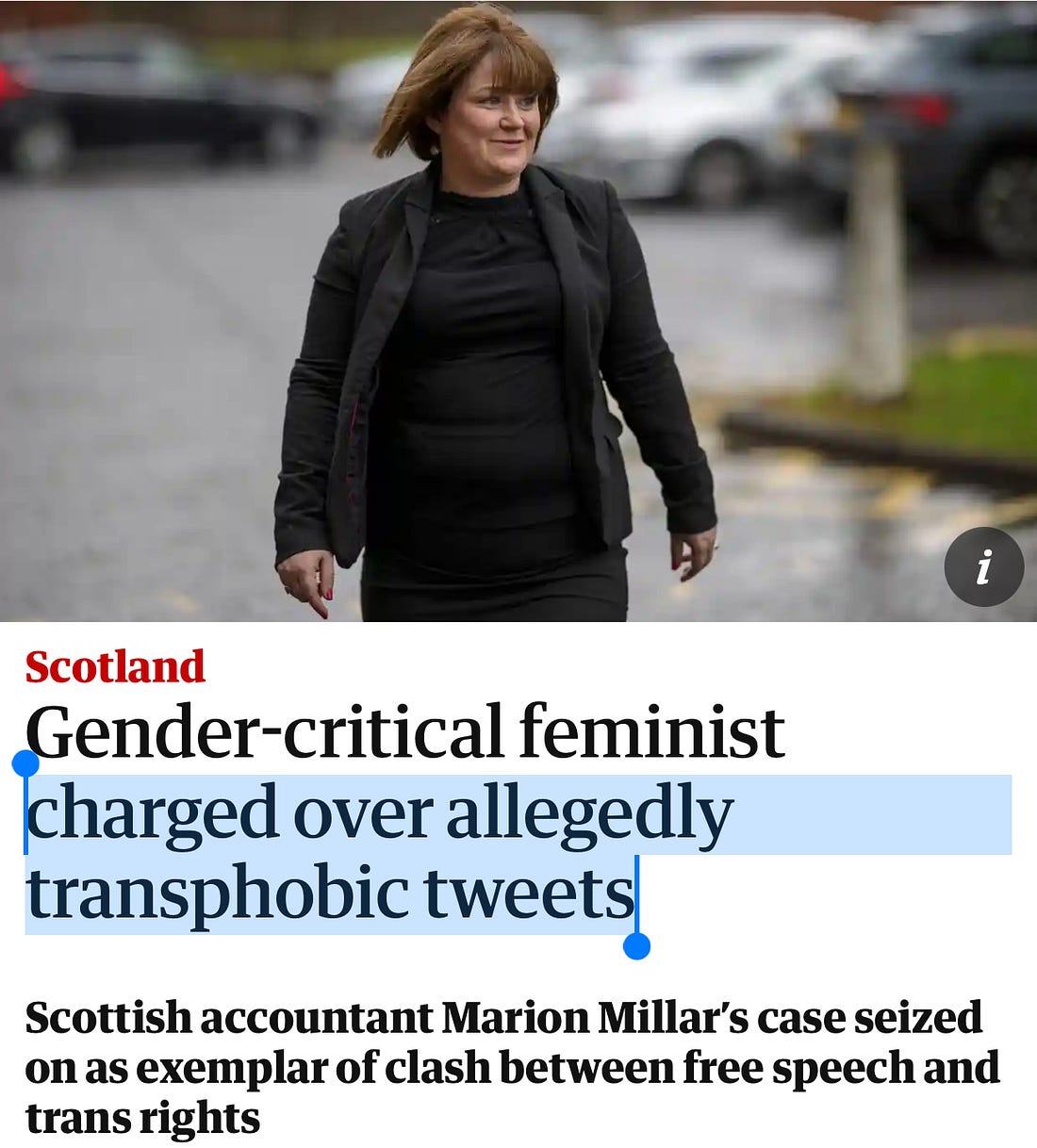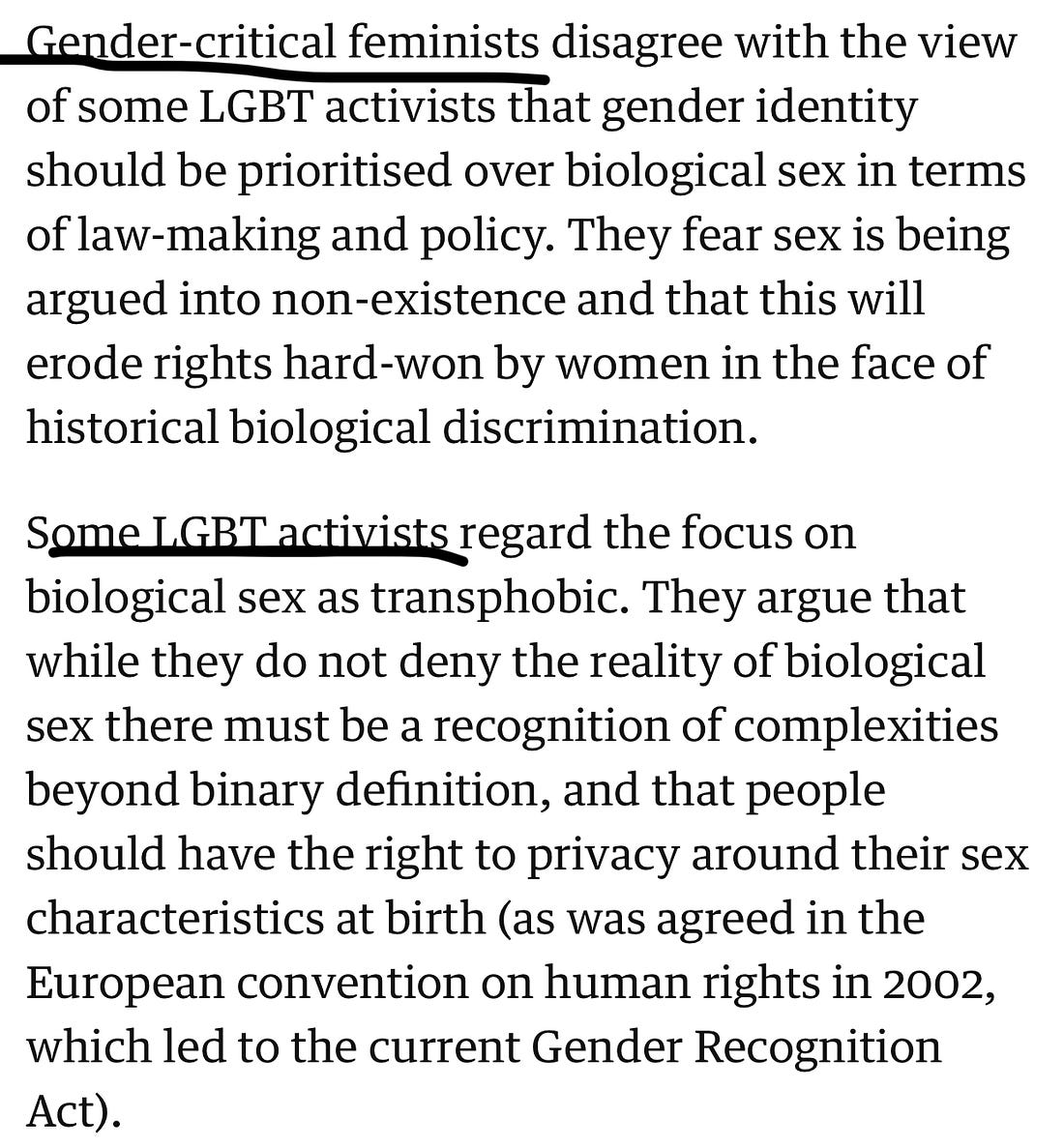Why does the Guardian do this?
The Guardian published a story today under the headline “Gender-critical feminist charged over allegedly transphobic tweets.” Every part of the headline is a misleading lie, and the newspaper should withdraw the story entirely, which reveals serious and structural errors in the paper’s reporting of LGBT issues.
The story concerns Marion Millar, an anti-trans campaigner, who was arrested in Glasgow. I have been involved in anti-cop politics for a long time, and do not support the arrest. Indeed, I imagine that most trans people I know are equally opposed to the use of the police state to apparently safeguard our interests.
However, the Guardian article provides no evidence whatsoever that Millar’s arrest was for “allegedly transphobic tweets.” And it probably wasn’t. The relevant section of the law Brooks cites, the Communications Act 2003, prohibits a range of behaviors, of which the circulation of “material that is grossly offensive” is only one. The section also prohibits communication that is “of an indecent, obscene, or menacing character.”
In other words, the Act includes explicit threats made against individuals, a class of speech that is legally and morally distinct from “free speech,” by also from “allegedly transphobic” speech.
Also, Libby Brooks, nor anyone else, has provided any evidence whatsoever for the claim that the electronic communication in question occurred over Twitter. Evidence I have seen suggests that it was not.
Now, in a tweet on my thread, Brooks admits that she has no idea about the content of the tweets for which Millar was arrested.

So who came up with the phrase “allegedly transphobic”? Brooks or editors?
Either the Guardian headline referred to evidence it didn’t present, or was completely made up. Almost certainly the latter.
I will say again: I do not think that Millar should have been arrested. I don’t think anyone should be. The 2003 Act also seems overly broad (though since I advocate the abolition of all criminal statutes, I’m not going to get into debating the minutiae of an electronic communications provision). But this is also an opportunity for the British liberal media to ask why they so consistently get trans issues wrong.
The headline is only one of a couple of serious problems with the article. Notwithstanding that Millar self-identifies as a “feminist,” the use of that term to describe anti-trans activists is profoundly controversial, and creates the impression that the parties in contention are “gender critical feminists” and “some LGBT activists.” In fact, many feminists—Sally Hines, Alison Phipps, Judith Butler, Sara Ahmed, and Roxane Gay, to say nothing of trans feminist activists like Julia Serano and Susan Stryker—are outspoken defenders of trans civil rights. In reality, the group to whom Brooks refers as “gender critical feminists” is an online hate movement, with only occasional and minor overlap with feminism.
Yet look at how Brooks frames the disagreement:
The two paragraphs contain several serious errors. The central problem is that nowhere is the view ascribed to “some LGBT activists” attributed. Despite seeking block quotes from For Women Scotland and Police Scotland, the opinions of these unnamed “LGBT activists” are conveyed in garbled, barely comprehensible paragraph that describes no sensible view at all. That a paragraph that makes as little sense as this was able to pass through editorial review without anyone asking what it means reveals one thing very clearly: Guardian editors don’t care what garbage views they attribute to trans people, as long as they can portray us as mincing snowflakes armed with speech codes.
Whereas of course the anti-trans activists “fear sex is being argued into non-existence” (another passive construction, to avoid naming anyone who might need to be cited), and that “this will erode rights hard-won by women.” Nothing could be further from the truth. As has been amply illustrated by Twitter accounts like @GCMisogyny, the so called “gender critical” movement is a radical anti-trans movement with ties to far-right organizations like the Heritage Foundation. Indeed, it is a hate group that (predictably enough) engages in precisely the kind of anti-Semitic conspiracy theorizing that one associates with QAnon, probably the closest US equivalent to the UK GCs. See Christa Peterson’s excellent thread here:
If Libby Brooks wants to speculate about the content of the charge against Marion Millar, she would do better to look at recent legal cases involving prominent GCs. At Julie Birchall, for example, who paid Ash Sarkar substantial damages after accusing her of “worshipping a paedophile.” (Sarkar is a Muslim.) Or at Graham Linehan, who has baselessly accused me of “grooming” students at UC Berkeley. Like QAnon, GCs see pedophiles everywhere—or, at least, everywhere they encounter anyone who isn’t straight, white, and middle-class.
But better yet: Brooks should not speculate. Brooks should acknowledge that she has no idea why Millar has been charged, and the article should be withdrawn completely.
Oh, and message to the Guardian: hire ten trans journalists in editorial and managerial positions yesterday.
∿


